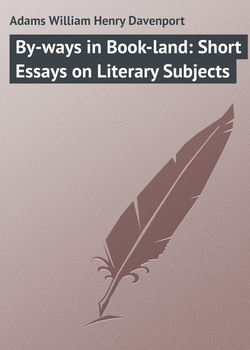By-ways in Book-land: Short Essays on Literary Subjects

Реклама. ООО «ЛитРес», ИНН: 7719571260.
Оглавление
Adams William Henry Davenport. By-ways in Book-land: Short Essays on Literary Subjects
PAPER-KNIFE PLEASURES
RUSKIN AS POET
ELECTIONS IN LITERATURE
FAMILIAR VERSE
SHAKESPEARE’S ENGLAND
HEREDITY IN SONG
STINGS FOR THE STINGY
DIALOGUES OF THE DEAD
SERMONS IN FLOWERS
‘DON QUIXOTE’ IN ENGLAND
BEDSIDE BOOKS
THEIR MUCH SPEAKING
PEERS AND POETRY
THE PRAISE OF THAMES
ENGLISH EPIGRAPHS
THE ‘SEASON’ IN SONG
THE ‘RECESS’ IN RHYME
JAQUES IN LOVE
MOCKING AT MATRIMONY
PARSON POETS
THE OUTSIDES OF BOOKS
THE NOT IMPOSSIBLE SHE
NONSENSE VERSES
SINGLE-SPEECH HAMILTONS
DRAMATIC NOMENCLATURE
PUNS AND PATRONYMICS
‘YOURS TRULY.’
POSTSCRIPTS
Отрывок из книги
It was lately rumoured that Mr. Ruskin was about to issue a volume of poems, consisting mainly of pieces already published. The statement was probably the first intimation received by many that the author of ‘Modern Painters’ had ever written anything in the shape of verse. That he has always been, like Sidney, a ‘warbler of poetic prose,’ has lately been emphasized by a magazine-writer; but it is not at all universally known that between the years 1835 and 1845 Mr. Ruskin figured somewhat largely as a poet, in the popular sense of that much abused word. During that time he produced a good deal of verse, in addition to the prize poem which has always been readily accessible by his admirers.
Even if one had not known, it would not have been difficult to have assumed, from the rhythmic character of Mr. Ruskin’s prose, that he had at one time ‘dropped into poetry.’ Such a master of rhetoric could hardly have gone through life without wooing the Muse of Song, however temporarily or unsuccessfully. It would not have been natural for him to have done so. And, indeed, it is probable that no great prose rhetorician has failed to pay the same homage to the charm of verbal melody and cadence. In all the most sonorous prose turned out by English authors there will be found a lilt and a swing which would without difficulty translate themselves into verse. ‘Most wretched men,’ says Shelley, ‘are cradled into poetry by wrong.’ Most literary men have been cradled into it by their irresistible feeling and aptitude for rhythm, together with that general poetic sensibility which is rarely absent from the nature of the literary artist. Certain it is that practice in verse has always been recognised as the best of all preparation for work in prose, and no doubt much of Mr. Ruskin’s success as prose-producer has been owing to his early devotion to the Muse.
.....
Herein, it will be seen, is something of the power of description which the writer was afterwards to exhibit so much more effectively in prose.
Four years later Mr. Ruskin’s initials were to be seen appended to a couple of pieces in verse contributed to ‘The Amaranth,’ an annual of much more imposing presence than the ‘Offering’ – edited by T. K. Hervey, admirably illustrated, and happy in the practical support of such literary lights as Horace Smith, Douglas Jerrold, Sheridan Knowles, Thomas Hood, Praed, and Mrs. Browning. One of the two pieces in question is ‘The Wreck,’ in which Mr. Ruskin’s poetic capability, such as it is, is visible in one of its most attractive moods. The last verse runs:
.....